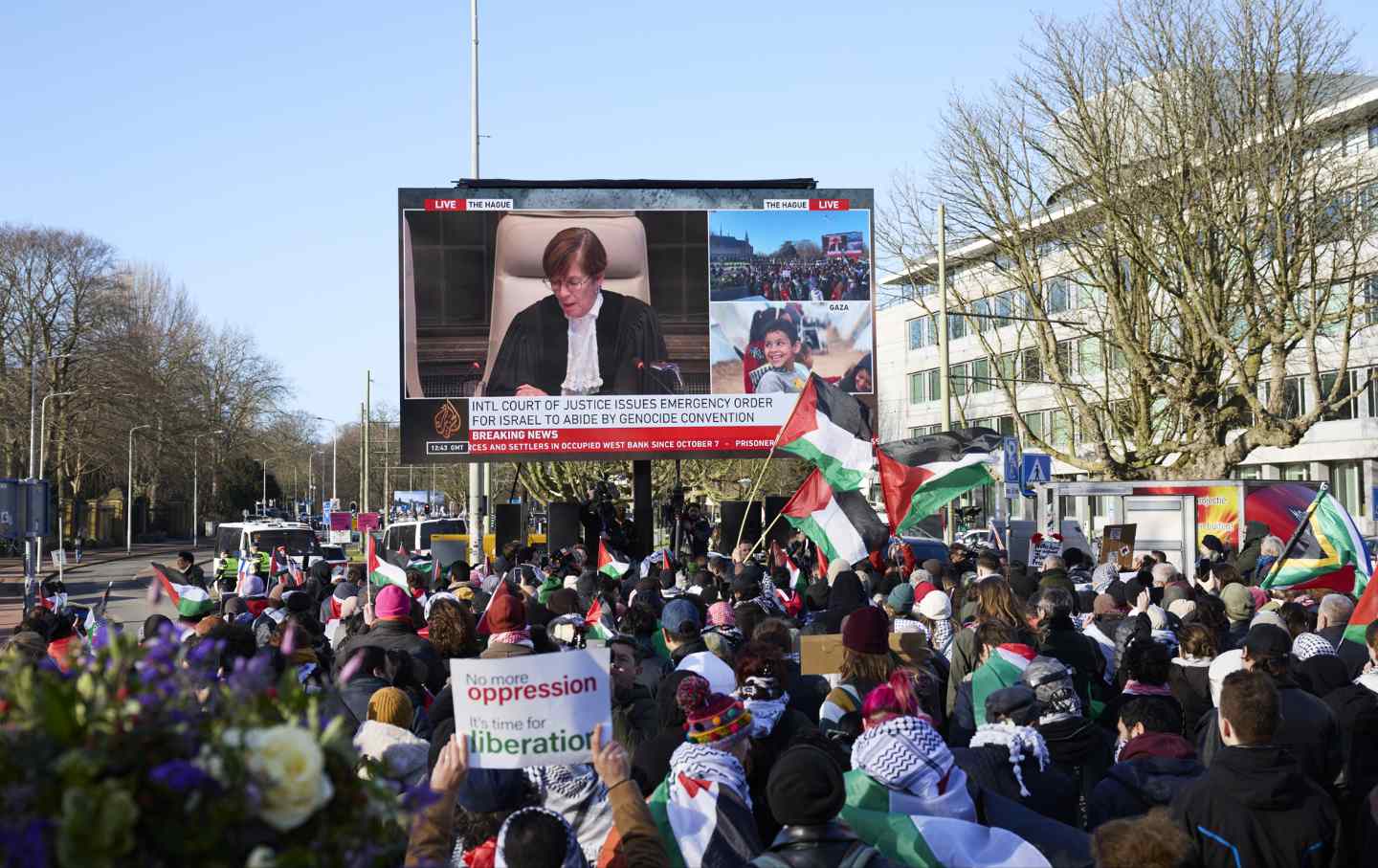
Pro-Palestinian supporters watch proceedings outside the International Court of Justice during the court ruling in The Hague, the Netherlands, on Friday, January 26, 2024.
(Ksenia Kuleshova / Bloomberg via Getty Images)On Friday morning, the International Court of Justice ruled that it was “plausible” that Israel committed acts of genocide in its ongoing bombardment of Gaza.
The judgment from the highest court at the United Nations came in response to a case brought against Israel by South Africa, which has charged Israel with violating the Genocide Convention. Israel, which has denied any charges of genocide, had hoped to have the case thrown out entirely. But the ICJ refused to do so, saying that South Africa had successfully shown that “at least some” of Israel’s actions in Gaza might violate the convention.
The ICJ may take years to issue a final ruling on whether Israel is guilty of genocide. In the short term, though, it ordered Israel to take immediate steps to ensure that it is not acting in breach of the convention. Though it specified that this included refraining from “killing members of the group” that Israel is targeting—in other words, Palestinians in Gaza—it did not explicitly call for a cease-fire, a step that South Africa had asked for.
The court’s rulings are legally binding in theory, but in practice, it has no mechanism to enforce its judgments. Some members of Israel’s government quickly signaled their contempt for the ruling, with Minister of National Security Itamar Ben-Gvir tweeting, “Hague Schmague.” (In a statement on the ruling, a State Department spokesperson said, “We continue to believe that allegations of genocide are unfounded and note the court did not make a finding about genocide or call for a ceasefire in its ruling, and that it called for the unconditional, immediate release of all hostages being held by Hamas.”)
To find out more about the significance and the implications of the ruling, I spoke to Omar Shakir, the Israel and Palestine director at Human Rights Watch.
—Jack Mirkinson
Jack Mirkinson: What is your assessment of the ruling?
Omar Shakir: This was a watershed moment and a landmark decision. It puts Israel and its allies on notice that immediate action is needed to prevent genocide and further atrocities against Palestinians in Gaza. Not only did the court uphold that there is a dispute between the parties, and therefore jurisdiction for the court under the Genocide Convention, but, critically, it found that the claims South Africa made under the Genocide Convention were plausible. There was a very powerful recitation in the decision of some of the facts that led to that determination, including statements from Israeli government officials, a factual rendition of the killings and the dire humanitarian situation in Gaza, including starvation. There was also the inclusion of quotes from UN officials and World Health Organization officials underscoring the urgency of the situation.
And on top of that, the court issued binding provisional measures that are aimed at protecting the Palestinian people against further harm. The court underscored that lives hang in the balance and that it will scrutinize Israel’s actions. But also, it has put in place measures aimed at ensuring that Palestinians and Gaza who have faced Israeli war crimes are able to receive humanitarian aid and that there’s a stop of Israel’s actions that are causing great suffering.
JM: When the judgment came down, the first take on it from everybody was that there wasn’t this explicit call for a cease-fire. What’s your interpretation of that issue, and how much do you think it does or does not matter that the court didn’t make this binding order that there be an immediate cease-fire?
OS: I think it’s important to emphasize what the court did order. There were six orders from the court, all of which are really significant, and all of which are actions that have not been taken. There’s a clear order for the Israeli government to take measures to prevent genocide. There’s a clear instruction not to commit genocide. There are clear instructions to enable the provision of humanitarian aid and basic services. There is an order to prevent and to stop incitement to genocide. There is an order to preserve evidence. And then there’s an order that Israel must report back to the court within 30 days.
It’s also important when understanding the International Court of Justice and how it operates to understand there’s always a nexus between the underlying claim and the provisional orders that are issued. In this case, the claim was for genocide, and therefore the measures were put in place to prevent genocide. When it comes to the question of a cease-fire, the court did not have the power to order a cease-fire because not all parties to the armed conflict are in the courtroom.
Hamas is a non-state actor. The ICJ is hearing a proceeding between two states, in this case, South Africa and Israel. South Africa is not a party to the armed conflict. And so, similar to how it ruled in Gambia and Myanmar, the ruling here focuses on a call to prevent genocide, including all acts that are genocidal or that are part of the Genocide Convention.
That is quite a far-reaching order. The court has the opportunity in 30 days to review Israel’s compliance with this order and could at that point consider other measures.
JM: So, if I’m understanding correctly, when I read headlines saying the court “stops short of calling for a cease-fire,” you’re saying that’s actually something of a misreading of the jurisdiction that the court actually has and of the nature of this case.
OS: Right. So with Russia and Ukraine, you had a situation in which both parties to the armed conflict were in the courtroom, and the actual claims regarding the nature of the Russian invasion had a closer nexus to the remedies ordered there. Here, yes, South Africa did request other measures, including that the Israeli government cease their operations in Gaza. But that’s distinct from calling for a cease-fire between the warring parties, which was the way it’s been framed in some of the reporting.
The court had a very clear ruling regarding the need to prevent and end all acts that could amount to genocide. And very specifically around ensuring basic services and aid to enter. These are quite significant, and they’re actions that the Israeli government has not taken for more than four months. It has committed grave war crimes, including starvation of civilians as a weapon of war, collective punishment, and willful obstruction of humanitarian aid. And so there the ruling is quite clear that this needs to change, and if it doesn’t, the court has the option in 30 days to consider other actions.
Popular
“swipe left below to view more authors”Swipe →JM: What is the significance of the ruling within the larger historical context of the ICJ and of international law in general?
OS: It’s absolutely a unique moment. Human Rights Watch had colleagues that were in the courtroom today that were there during the oral hearings earlier in January, and they described an environment unlike any they recall seeing.
Of course, there have been significant ICJ rulings, particularly around the Genocide Convention, such as the case of Myanmar and Gambia. But I think these proceedings [were critical] given that the case was brought by South Africa, a state that has overcome its own history of apartheid and grave abuses, and the unprecedented—for Israel/Palestine—killings and suffering and brazen disregard for international law. Palestinians in Gaza had the opportunity to hear affirmed by a world court some of what they’ve experienced and have the court underscore the severity and urgency of the situation. I think symbolically that’s hugely significant.
And the Israeli government rather uniquely participated in these proceedings. It is often disregarded other UN or international investigations, but it participated in this one, which emphasizes that it considers itself bound by this law and by the Genocide Convention. Now that a court has called for it to act under that convention, it’s incumbent upon it to do so.
So I think the symbolism, but also the urgency of the situation and also the nature of a state like South Africa turning to the International Court of Justice, the world’s court, to hear this matter—all of [these things] make this a hugely significant moment and a real chance for states to reaffirm their commitment to international law and to the institutions like the International Court of Justice.
JM: You often see criticism of these international courts that their focus tends to be on countries or people in Africa or Asia and that violations of human rights and international humanitarian law from Western countries or their allies get overlooked. So what do you think it means to see this ruling against Israel, which is very aligned to those more powerful Western forces and is deeply allied to the United States?
OS: I think that perception has evolved in recent years. The International Criminal Court has a formal probe now into serious crimes committed in or from Palestine. You’re seeing investigations also in other contexts that the court has looked into. But I think there is a perception in many parts of the world that in Europe and the United States, there are double standards when it comes to respect for international humanitarian law, and it’s, I think, undeniable that the United States and the United Kingdom and states in Europe have employed double standards when it comes to their invocation of international humanitarian law.
If you compare responses to the Myanmar case, to the situation in Ukraine, to the situation in Israel/Palestine, you’ll find numerous states that have employed clear double standards. This case was really a chance for states to affirm their commitment to the rules-based international order and the priority right now is to help ensure compliance with the court’s binding order. In that respect, it’s been welcome to see some states, including states like Germany and the EU, reiterate that this is a binding decision and that it needs to be enforced.
And should Israel fail to comply, states should use all forms of leverage including bilateral relationships, sanctions, embargoes, trade—all options, all tools should be on the table to ensure compliance.
JM: The US position was that this was a case without merit. What do you think the emphatic nature of the ruling, particularly one handed down by an American judge, says about those efforts by the US to denigrate this case?
OS: Look, I think the gravity and the severity of the abuses we see in Gaza merit this sort of probe. Even if a state does not agree with South Africa’s underlying contention, all states should support an effort by the International Court of Justice to ascertain the facts, to reach a determination on what those facts amount to, and to consider provisional measures to protect Palestinians who are currently at risk. That should be uncontroversial.
The real test will be what the United States does at this point, because, regardless of what they may have thought about the dispute, the court has now issued provisional measures that are legally binding, and the United States should use all forms of its leverage to ensure its enforcement.
Most directly, the United States continues to provide arms to the Israeli government despite the clear risk that could be used in the commission of grave abuses. The US should impose an arms embargo on Israel. It should suspend those arms so long as these abuses continue. It should have done so weeks ago, but this court ruling underscores the urgency of doing so.
You now have the world’s highest court saying that allegations of genocide are plausible. To continue to supply weapons when the world’s highest court has reached that sort of preliminary determination, and is now doing a more in-depth probe on the underlying case, risks complicity in those grave abuses.
JM: What in theory are the mechanisms that the rest of the world has to enforce any of these things if Israel signals that it doesn’t want to abide by them?
OS: It is a binding decision, but of course, the ICJ doesn’t have an enforcement arm. Certainly, the UN Security Council could take action to enforce the decision, but we know with the US veto that’s unlikely. So really it’s incumbent upon states including Israel’s allies to take action to ensure compliance with this decision. How many more civilians must suffer and be killed before states take action to end these atrocities?
Should Israel fail to comply with this binding order, it would reinforce its decades-long, flagrant disregard for international law, international justice, and the rules-based international order and civilian life. It has been put on notice that it needs to act to prevent genocide and further atrocities. Should it fail to do so, it should spur states to support the International Criminal Court’s Office of the Prosecutor’s formal probe into serious crimes committed in or from Palestine, because ultimately that is the venue for holding individuals criminally to account for grave abuses.
JM: And what kind of longer-term damage do you think it could do to the ability of the world to respond to these kinds of grave human rights violations if Israel does not comply and it is not held accountable for that noncompliance by governments like the United States or by the UN Security Council?
OS: The unprecedented atrocities we’re seeing in Israel/Palestine present a real test—and the international community has largely failed that test. We’ve seen nearly four months of these abuses continue. I think failure to act on abuses of international humanitarian law will have consequences not only for civilians in Israel and Palestine but much further beyond.
Whatever has transpired so far, this decision offers an opportunity for a refresh, for the international community to get on the right side of history. Should they fail that test, the ramifications will be felt far beyond Israel and Palestine.
Support independent journalism that does not fall in line
Even before February 28, the reasons for Donald Trump’s imploding approval rating were abundantly clear: untrammeled corruption and personal enrichment to the tune of billions of dollars during an affordability crisis, a foreign policy guided only by his own derelict sense of morality, and the deployment of a murderous campaign of occupation, detention, and deportation on American streets.
Now an undeclared, unauthorized, unpopular, and unconstitutional war of aggression against Iran has spread like wildfire through the region and into Europe. A new “forever war”—with an ever-increasing likelihood of American troops on the ground—may very well be upon us.
As we’ve seen over and over, this administration uses lies, misdirection, and attempts to flood the zone to justify its abuses of power at home and abroad. Just as Trump, Marco Rubio, and Pete Hegseth offer erratic and contradictory rationales for the attacks on Iran, the administration is also spreading the lie that the upcoming midterm elections are under threat from noncitizens on voter rolls. When these lies go unchecked, they become the basis for further authoritarian encroachment and war.
In these dark times, independent journalism is uniquely able to uncover the falsehoods that threaten our republic—and civilians around the world—and shine a bright light on the truth.
The Nation’s experienced team of writers, editors, and fact-checkers understands the scale of what we’re up against and the urgency with which we have to act. That’s why we’re publishing critical reporting and analysis of the war on Iran, ICE violence at home, new forms of voter suppression emerging in the courts, and much more.
But this journalism is possible only with your support.
This March, The Nation needs to raise $50,000 to ensure that we have the resources for reporting and analysis that sets the record straight and empowers people of conscience to organize. Will you donate today?
More from The Nation
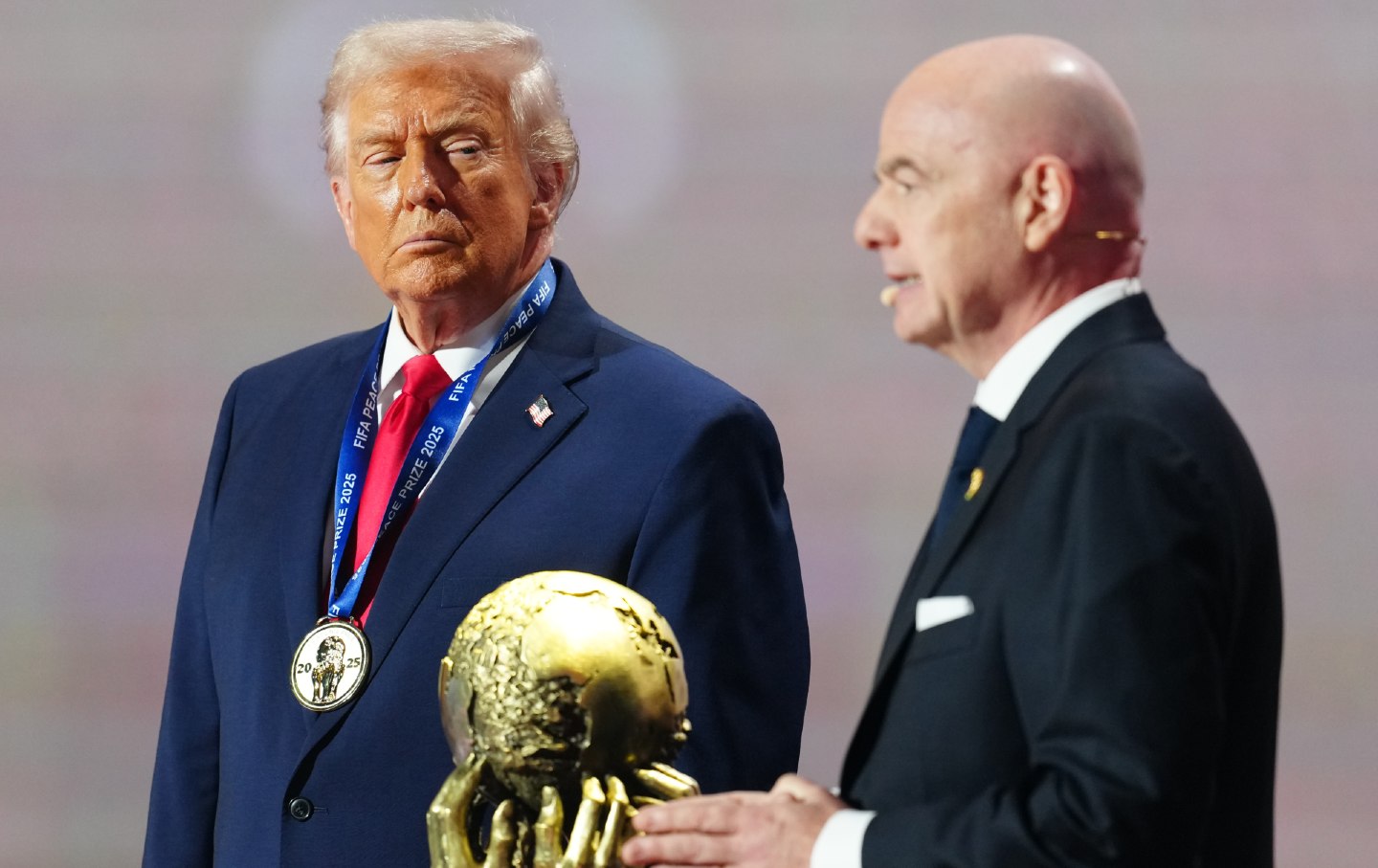
Trump and His Soulless Cronies Have Managed to Suck the Joy Out of the World Cup Trump and His Soulless Cronies Have Managed to Suck the Joy Out of the World Cup
Not even soccer is immune from Trump’s reverse Midas touch.
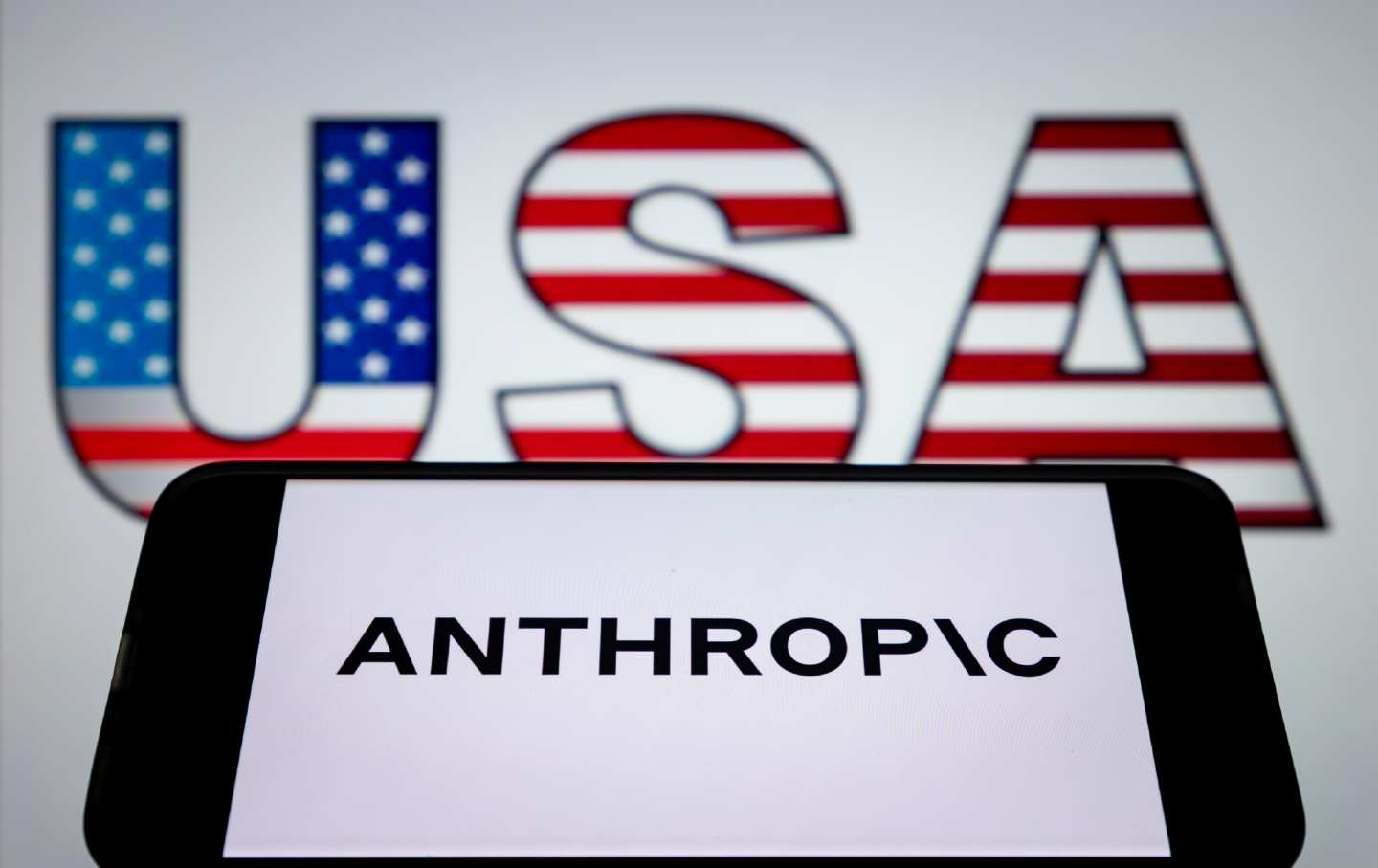
Garbage In, Carnage Out Garbage In, Carnage Out
The harrowing lessons of the Pentagon’s recently dissolved partnership with Anthropic.
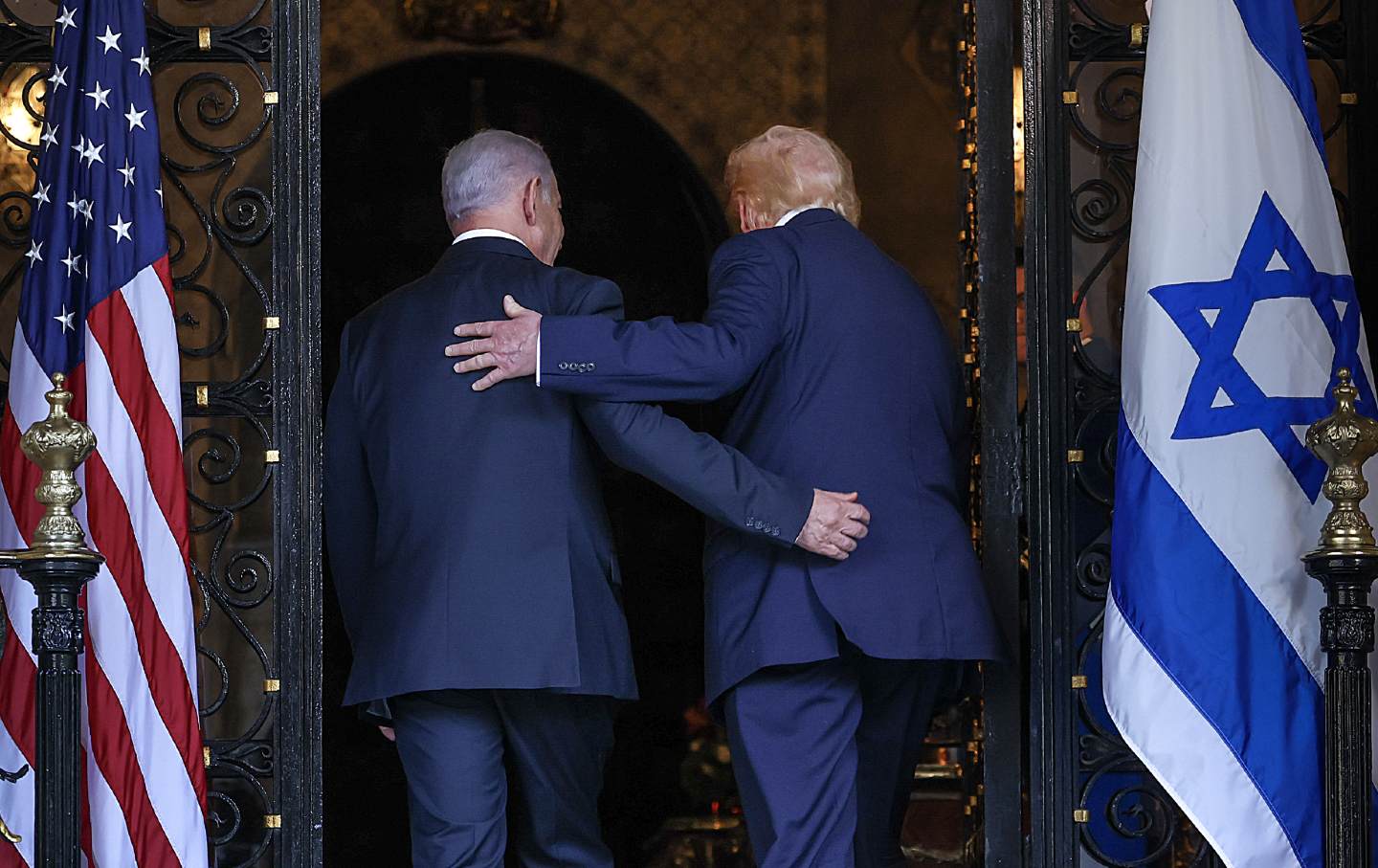
The Iran War Could Be Catastrophic for the US-Israel Alliance. Good. The Iran War Could Be Catastrophic for the US-Israel Alliance. Good.
As Israel’s role in pushing the war with Iran comes into ever sharper focus, it’s up to us to turn outrage into change.
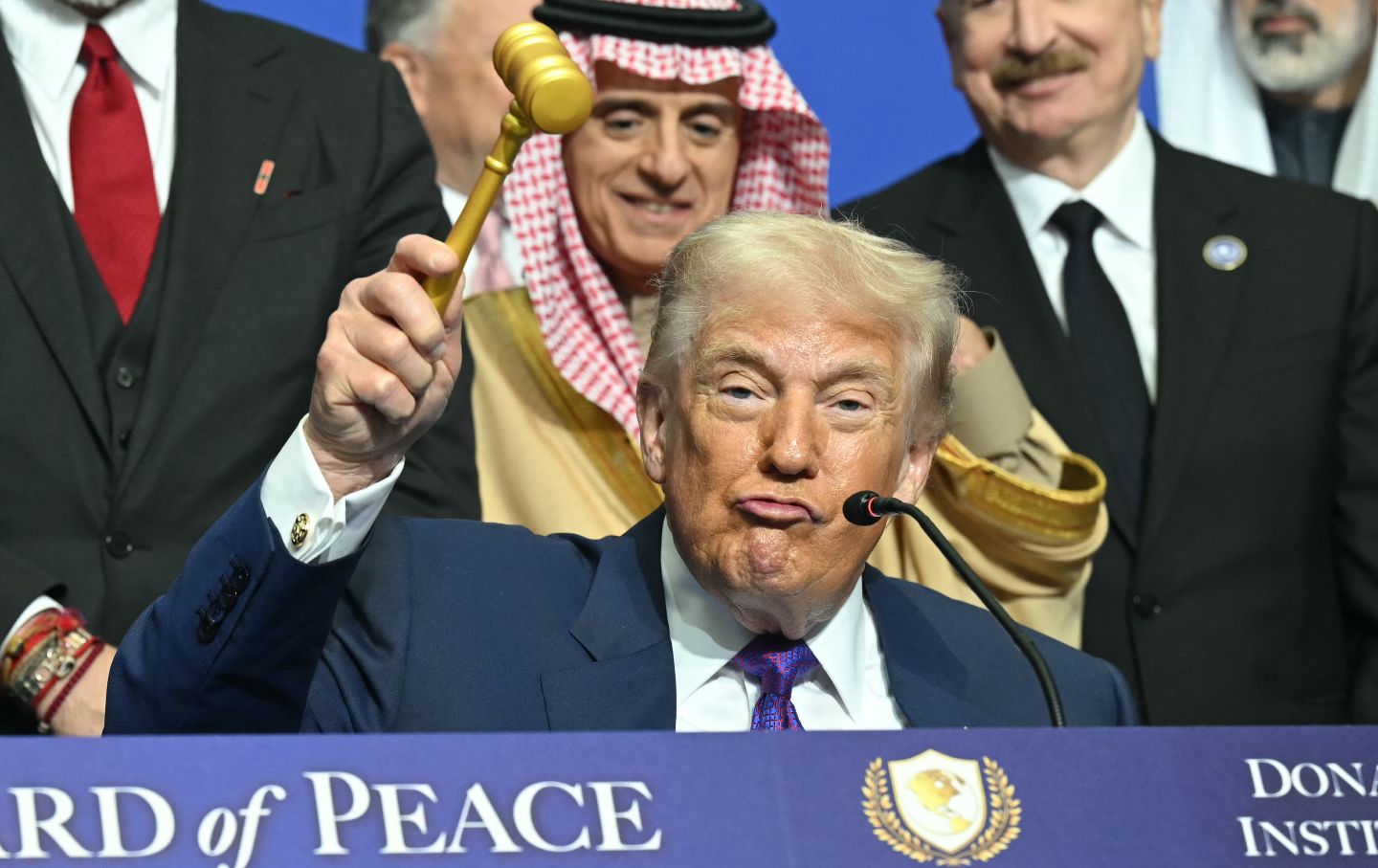
An Unlawful War An Unlawful War
The precedent being set by the US in launching this war of aggression against Iran will long live in infamy.
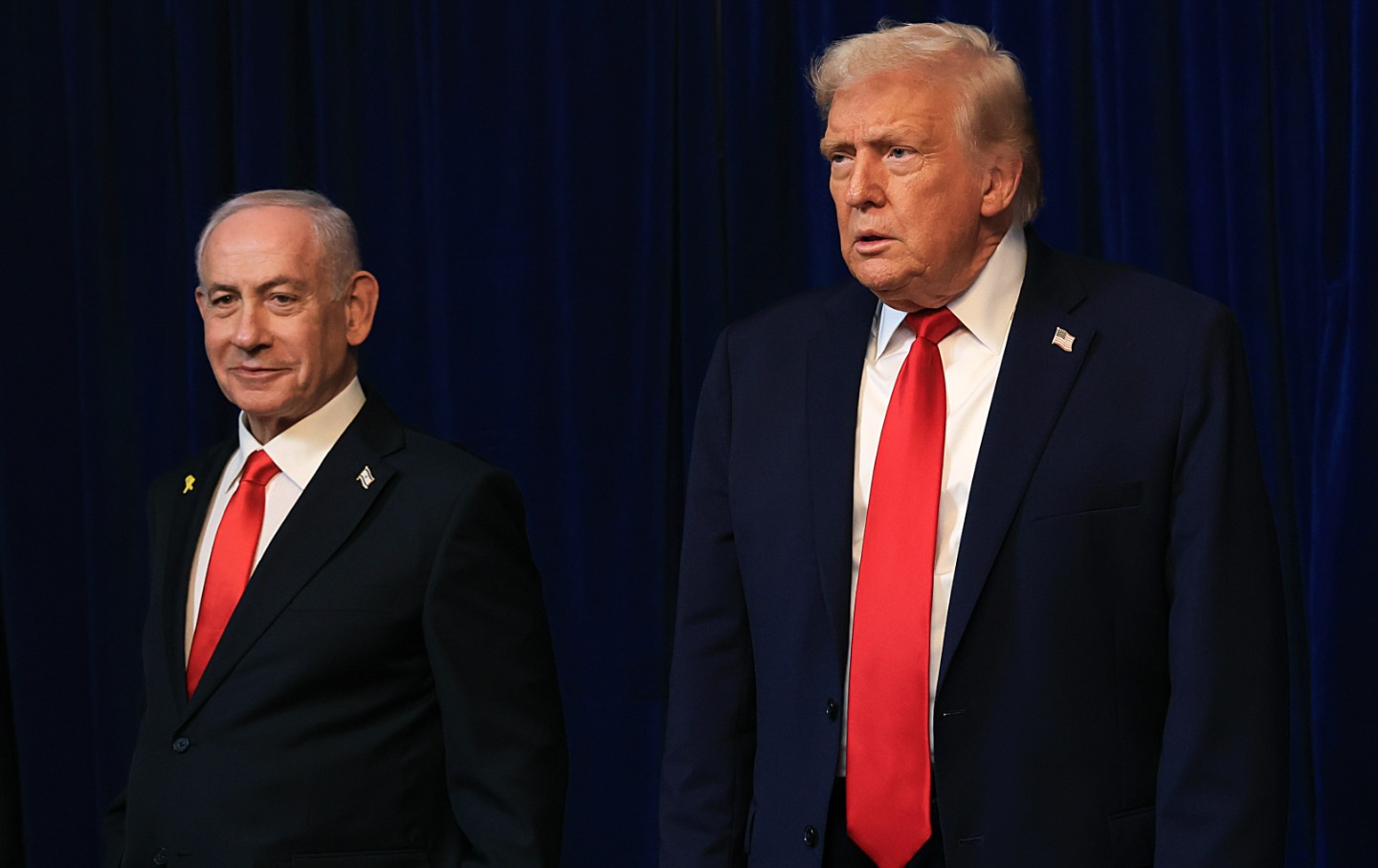
Trump and Netanyahu Want to Turn Iran Into a Failed State Trump and Netanyahu Want to Turn Iran Into a Failed State
This war looks designed to cause maximum chaos and instability. The world will pay a high price.
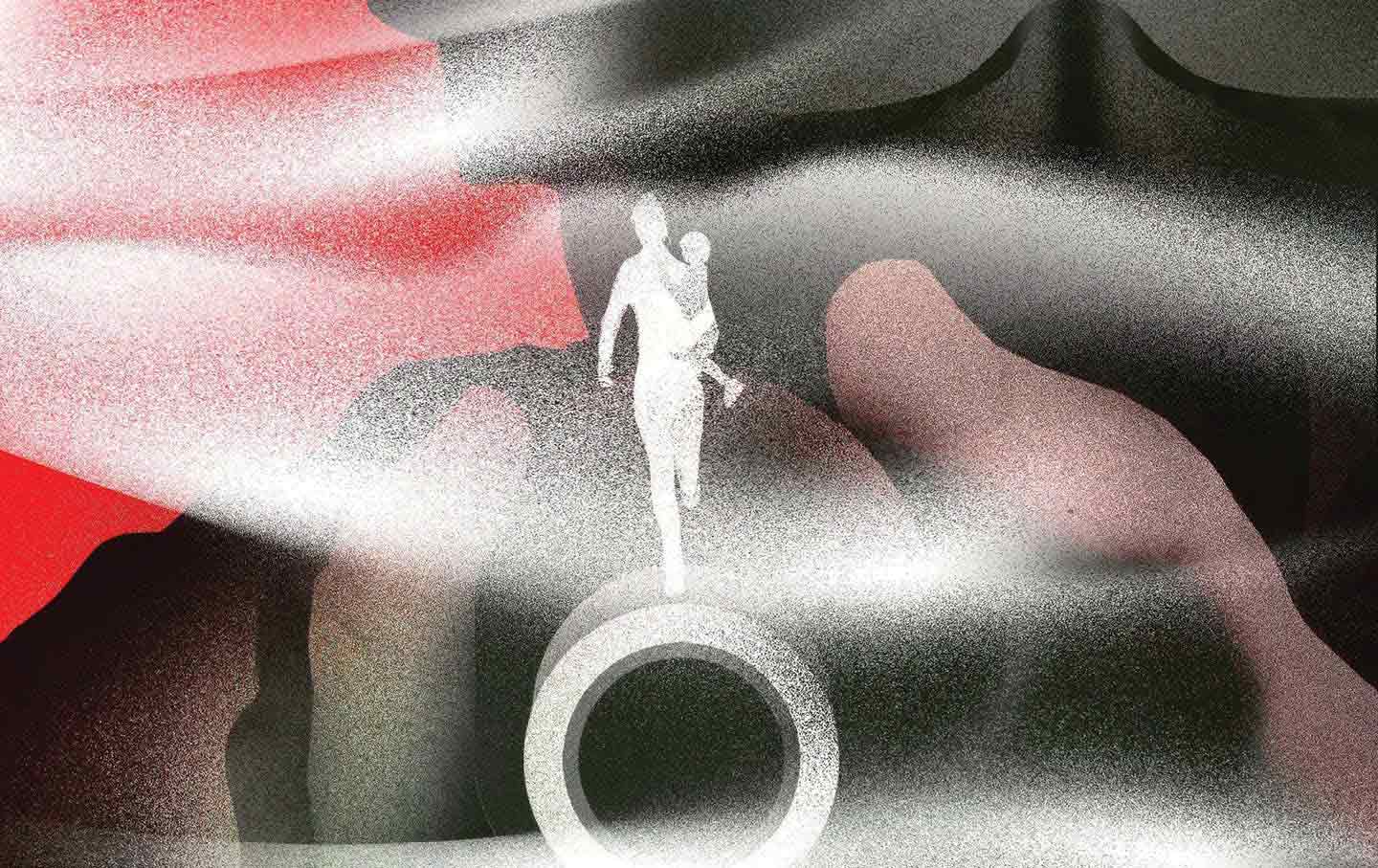
The War on Terror Paved the Way for Trump’s Rise—Now He’s Making It His Own The War on Terror Paved the Way for Trump’s Rise—Now He’s Making It His Own
Only the total abolition of the DHS can restore freedom.


